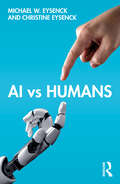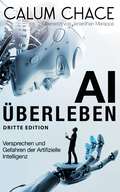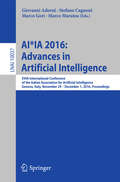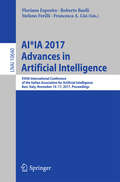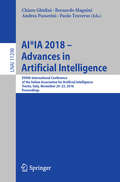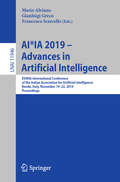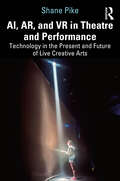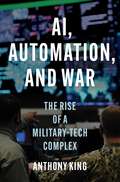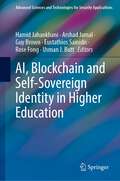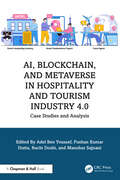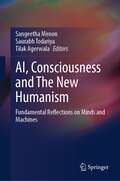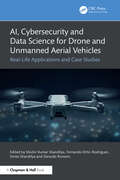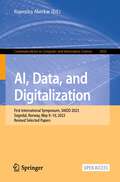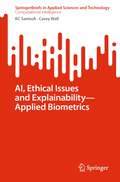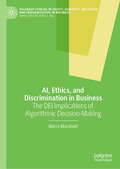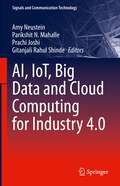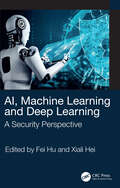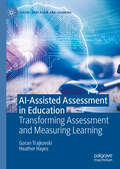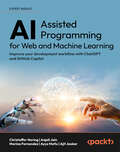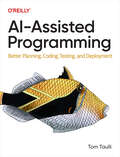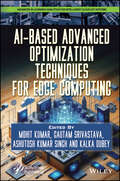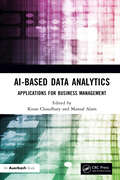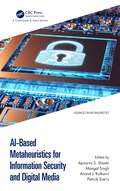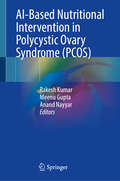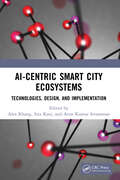- Table View
- List View
AI vs Humans
by Michael W. Eysenck Christine EysenckThe great majority of books on artificial intelligence are written by AI experts who understandably focus on its achievements and potential transformative effects on society. In contrast, AI vs Humans is written by two psychologists (Michael and Christine Eysenck) whose perspective on AI (including robotics) is based on their knowledge and understanding of human cognition. This book evaluates the strengths and limitations of people and AI. The authors’ expertise equips them well to consider this by seeing how well (or badly) AI compares to human intelligence. They accept that AI matches or exceeds human ability in many spheres such as mathematical calculations, complex games (e.g., chess, Go, and poker), diagnosis from medical images, and robotic surgery.However, the human tendency to anthropomorphise has led many people to claim mistakenly that AI systems can think, infer, reason, and understand while engaging in information processing. In fact, such systems lack all those cognitive skills and are also deficient in the quintessentially human abilities of flexibility of thinking and general intelligence. At a time when human commitment to AI appears unstoppable, this up-to-date book advocates a symbiotic and co-operative relationship between humans and AI. It will be essential reading for anyone interested in AI and human cognition.
AI überleben: Das Versprechen und die Gefahr Artifizielle Intelligenz
by Janardhan MarappaDies ist das Jahrhundert zweier Singularitäten – der wirtschaftlichen Singularität (technologische Arbeitslosigkeit) und der technologischen Singularität (Intelligenzexplosion). Beides birgt enorme Chancen und enorme Herausforderungen. Wenn wir sie erfolgreich verwalten, ist unsere Zukunft als Spezies mehr als wunderbar. Wenn wir versagen, könnte es miserabel sein - und vielleicht kurz. Der Treiber ist Artifizelle Intelligenz (AI) - die leistungsstärkste Technologie der Menschheit. Software, die Probleme löst und Daten in Erkenntnisse umwandelt, hat unser Leben bereits revolutioniert, und die Revolution beschleunigt sich. Das Argument dieses Buches ist, dass wir die stattfindenden Veränderungen überwachen und Richtlinien verabschieden sollten, die die bestmöglichen Ergebnisse fördern. Die Bandbreite der möglichen Ergebnisse ist groß, vom Schrecklichen bis zum Wunderbaren, und sie sind nicht vorherbestimmt. Sie werden zum Teil durch Glück, zum Teil durch ihre eigene interne Logik, zum Teil aber auch durch die Politik auf allen Ebenen der Gesellschaft ausgewählt. Automatisierung und Superintelligenz sind die beiden Entwicklungen, von denen wir bereits sehen, dass sie wahrscheinlich enorme Auswirkungen haben werden. Automatisierung könnte zu einer wirtschaftlichen Singularität und der Entwicklung einer völlig anderen Art von Wirtschaft führen. Wenn wir das falsch verstehen, könnte eine Elite die Produktionsmittel besitzen und den Rest von uns in einem dystopischen technologischen autoritären Regime unterdrücken. Wenn wir es richtig machen, könnten wir eine Wirtschaft des radikalen Überflusses genießen, in der niemand arbeiten muss, um seinen Lebensunterhalt zu verdienen, und wir alle frei sind, Spaß zu haben, unseren Geist zu dehnen und unsere Fähigkeiten voll zu entfalten. Die Ankunft der Superintelligenz wird, falls und wenn sie eintritt, eine technologische Singularität darstellen, die das bedeutendste Ere
AI*IA 2016 Advances in Artificial Intelligence: XVth International Conference of the Italian Association for Artificial Intelligence, Genova, Italy, November 29 – December 1, 2016, Proceedings (Lecture Notes in Computer Science #10037)
by Giovanni Adorni, Stefano Cagnoni, Marco Gori and Marco MarateaThis book constitutes the refereed proceedings of the 15th International Conference of the Italian Association for Artificial Intelligence, AI*IA 2016, held in Genova, Italy, in November/December 2016. The 39 full papers presented were carefully reviewed and selected from 53 submissions. The papers are organized in topical sections on optimization and evolutionary algorithms; classification, pattern recognition, and computer vision; multi-agent systems; machine learning; semantic web and description logics; natural language processing; planning and scheduling; and formal verification.
AI*IA 2017 Advances in Artificial Intelligence: XVIth International Conference of the Italian Association for Artificial Intelligence, Bari, Italy, November 14-17, 2017, Proceedings (Lecture Notes in Computer Science #10640)
by Stefano Ferilli Roberto Basili Floriana Esposito Francesca A. LisiThis book constitutes the refereed proceedings of the 16th International Conference of the Italian Association for Artificial Intelligence, AI*IA 2017, held in Bari, Italy, in November 2017. The 37 full papers presented were carefully reviewed and selected from 91 submissions. The papers are organized in topical sections on applications of AI; natural language processing; knowledge representation and reasoning; knowledge engineering, ontologies and the semantic web; machine learning; philosophical foundations, metacognitive modeling and ethics; and planning and scheduling.
AI*IA 2018 – Advances in Artificial Intelligence: XVIIth International Conference of the Italian Association for Artificial Intelligence, Trento, Italy, November 20–23, 2018, Proceedings (Lecture Notes in Computer Science #11298)
by Chiara Ghidini Paolo Traverso Bernardo Magnini Andrea PasseriniThis book constitutes the refereed proceedings of the XVIIth International Conference of the Italian Association for Artificial Intelligence, AI*IA 2018, held in Trento, Italy, in November 2018. The 41 full papers were carefully reviewed and selected from 67 submissions. The papers have been organized in the following topical sections: Agents and Multi-Agent Systems; Applications of AI; Knowledge Engineering, Ontologies and the Semantic Web; Knowledge Representation and Reasoning; Machine Learning; Natural Language Processing; Planning and Scheduling; and Recommendation Systems and Decision Making.
AI*IA 2019 – Advances in Artificial Intelligence: XVIIIth International Conference of the Italian Association for Artificial Intelligence, Rende, Italy, November 19–22, 2019, Proceedings (Lecture Notes in Computer Science #11946)
by Mario Alviano Gianluigi Greco Francesco ScarcelloThis book constitutes the proceedings of the XVIIIth International Conference of the Italian Association for Artificial Intelligence, AI*IA 2019, held in Rende, Italy, in November 2019. The 41 full papers were carefully reviewed and selected from 67 submissions. The papers have been organized in the following topical sections: Knowledge Representation for AI, AI and Computation, Machine Learning for AI, and AI and Humans.
AI, AR, and VR in Theatre and Performance: Technology in the Present and Future of Live Creative Arts
by Shane PikeAI, AR, and VR in Theatre and Performance investigates the cutting-edge application of evolving digital technologies within the creative industries, with a focus on theatre and the dramatic arts.Grounded in a practice-based approach, this book explores the experiences of creatives, producers, and IT-specialist content creators employing artificial intelligence (AI), augmented reality (AR), and virtual reality (VR) technologies. A series of international case studies are presented, demonstrating current techno-infused practices, as well as potential futures for these technologies within the broadest of creative contexts. Framed by a rigorous ethnodramatic methodological approach, the book examines the practical applications of contemporary digital technologies in theatre and other live performance settings and provides a scaffolding framework for readers to adopt in their own practice. It also proposes groundbreaking ideas for the classification of how AI may be used in current and future artistic practices, the ‘three Cs of AI,’ and introduces the concept of Communal Augmented Reality – Live (CARL) as the most likely form to advance the incorporation of emerging technologies onto the live stage. The works of Belgium’s VR immersive experiences company CREW, Singapore-based film and visual artist Ho Tzu Nyen, and the Tamil language theatre company AGAM Theatre Lab are detailed alongside the world-first application of AR holographic technology in Australia, before unpacking the pioneering advancements in algorithmic and AI theatre of America’s Annie Dorsen.With a practice-based, artist-led perspective and contributions from technologists, this book offers a comprehensive and accessible resource that will appeal to a diverse audience of artists, academics, students, practitioners, creative engineers/content creators, animators, and theorists with an interest in the relationship between digital technologies and live performance.
AI, Automation, and War: The Rise of a Military-Tech Complex
by Anthony KingWhy AI will not replace human strategic judgement in warIs AI about to automate war? Will autonomous drone swarms and killer robots controlled by AI dominate the battlespace and determine the winner? In AI, Automation, and War, Anthony King debunks this science fiction–tinged narrative of AI&’s military potential, exploring instead the actual applications of AI by the armed forces over the last decade. He finds that AI is not going to replace human commanders and combatants; the machines are not about to take over. Rather, the military has used, and will continue to use, AI to process data at a scale and speed that exceeds the capacity of humans. AI will be used primarily to improve military understanding and intelligence.King explains that military commanders, enabled by the data processing power of AI, will be able to see the battlespace at a previously unattainable depth, fidelity, and speed. AI will help the armed forces plan, target, and conduct cyber operations faster and more effectively. In order to harness AI in this way, however, a radical organisational transformation is taking place. The armed forces are integrating civilian technologists into operational headquarters to work alongside military staff. This partnership between the armed forces and the technology sector signals the emergence of a military-tech complex that promises to be as powerful in this century as the military-industrial complex was in the last.
AI, Blockchain and Self-Sovereign Identity in Higher Education (Advanced Sciences and Technologies for Security Applications)
by Hamid Jahankhani Guy Brown Arshad Jamal Eustathios Sainidis Rose Fong Usman J. ButtThis book aims to explore the next generation of online learning challenges including the security and privacy issues of digital transformation strategies that is required in teaching and learning. Also, what efforts does the industry need to invest in changing mind-sets and behaviours of both students and faculty members in adoption of virtual and blended learning?The book provides a comprehensive coverage of not only the technical and ethical issues presented by the use of AI, blockchain and self-sovereign identity, but also the adversarial application of AI and its associated implications. The authors recommend a number of novel approaches to assist in better detecting, thwarting and addressing AI challenges in higher education.The book provides a valuable reference for cyber security experts and practitioners, network security professionals and higher education strategist and decision-makers. It is also aimed at researchers seeking to obtain a more profound knowledge of machine learning and deep learning in the context of cyber security and AI in higher education. Each chapter is written by an internationally renowned expert who has extensive experience in industry or academia. Furthermore, this book blends advanced research findings with practice-based methods to provide the reader with advanced understanding and relevant skills.
AI, Blockchain, and Metaverse in Hospitality and Tourism Industry 4.0: Case Studies and Analysis
by Pushan Kumar Dutta Adel Ben Youssef Ruchi Doshi Manohar SajnaniThe book offers a critical exploration of the integration of AI, blockchain, and metaverse technology in the hospitality and tourism industry to investigate the potential of these technologies in revolutionizing the industry. This comprehensive work studies, with practical examples, how cutting-edge technologies of Industry 4.0 are transforming luxury industry into a high-touch, hyper-personalized metaverse. It explains how these technologies can be used to improve customer experience and operational efficiency in areas such as guest interaction, supply chain management, payment processing, and virtual stores. The book also discusses the conditions that can promote sustainable development in the hospitality industry using Industry 4.0 technologies. Provides an innovative perspective by blending high-tech trends like AI, blockchain, and metaverse with traditional wellness practices Emphasis on ethical considerations and potential risks associated with the use of these technologies, providing a balanced perspective on their impact Includes case studies and practical examples on how businesses can use AI, blockchain, and the metaverse to improve customer experiences and operational efficiency Explores how the hospitality industry can embrace Industry 4.0 technologies to improve its operations, enhance customer experiences, and contribute to sustainable development Provides a roadmap for companies looking to implement these technologies, highlighting potential benefits and pitfalls of each approach This reference book is for scholars and professionals in computer science who are interested in studying the effect of AI, blockchain, and metaverse in hospitality and tourism industry.
AI, Consciousness and The New Humanism: Fundamental Reflections on Minds and Machines
by Sangeetha Menon Tilak Agerwala Saurabh TodariyaThis edited volume presents perspectives from computer science, information theory, neuroscience and brain imaging, aesthetics, social sciences, psychiatry, and philosophy to answer frontier questions related to artificial intelligence and human experience. Can a machine think, believe, aspire and be purposeful as a human? What is the place in the machine world for hope, meaning and transformative enlightenment that inspires human existence? How, or are, the minds of machines different from that of humans and other species? These questions are responded to along with questions in the intersection of health, intelligence and the brain. It highlights the place of consciousness by attempting to respond to questions with the help of fundamental reflections on human existence, its life-purposes and machine intelligence. The volume is a must-read for interdisciplinary and multidisciplinary researchers in humanities and social sciences and philosophy of science who wish to understand the future of AI and society.
AI, Cybersecurity and Data Science for Drone and Unmanned Aerial Vehicles: Real-Life Applications and Case Studies
by Shishir Kumar Shandilya, Fernando Ortiz-Rodriguez, Smita Shandilya and Gerardo RomeroThis book explores the transformative impact of drone technology and unmanned aerial systems (UAS) across diverse industries, from precision agriculture and logistics to disaster response and forensic investigations. It highlights how the integration of Artificial Intelligence (AI) into UAVs is addressing contemporary challenges, optimizing operations, and shaping the future of aerial systems. It offers technical methodologies, case studies, and a detailed roadmap for integrated drone forensics, making it an essential resource for understanding the dynamic sector of Intelligent Aerial Systems. Examines the integration of AI in drones and UAS, enhancing operational efficiency and investigative processes Covers the evolving landscape of drone technology, including swarms, autonomous systems, and forensic methodologies Focuses on specific sectors such as agriculture, logistics, and disaster response, offering practical insights, real-life examples, and future scenarios Explores the role of drones in delivery and logistics, transforming transportation systems by improving efficiency and reducing costs Explains the use of drones for public safety, smart city disaster response, and forensic investigations, providing critical insights for emergency operations This reference book serves as a comprehensive guide for professionals, researchers, and scholars interested in the rapidly advancing world of drone technology.
AI, Data, and Digitalization: First International Symposium, SAIDD 2023, Sogndal, Norway, May 9–10, 2023, Revised Selected Papers (Communications in Computer and Information Science #1810)
by Rajendra AkerkarThis open access book constitutes the revised selected papers of the First International Symposium on AI, Data and Digitalization, SAIDD 2023, held in Sogndal, Norway, during May 9–10, 2023.The 13 full papers included in this volume were carefully reviewed and selected from 42 submissions. The papers deal with the impact of data and AI on the digital revolution and their contribution to solving societal challenges.
AI, Ethical Issues and Explainability—Applied Biometrics (SpringerBriefs in Applied Sciences and Technology)
by KC Santosh Casey WallAI has contributed a lot and biometrics is no exception. To make AI solutions commercialized/fully functional, one requires trustworthy and explainable AI (XAI) solutions while respecting ethical issues. Within the scope of biometrics, the book aims at both revisiting ethical AI principles by taking into account state-of-the-art AI-guided tools and their responsibilities i.e., responsible AI. With this, the long-term goal is to connect with how we can enhance research communities that effectively integrate computational expertise (with both explainability and ethical issues). It helps combat complex and elusive global security challenges that address our national concern in understanding and disrupting the illicit economy.
AI, Ethics, and Discrimination in Business: The DEI Implications of Algorithmic Decision-Making (Palgrave Studies in Equity, Diversity, Inclusion, and Indigenization in Business)
by Marco MarabelliThis book takes a historical approach to explore data, algorithms, their use in practice through applications of AI in various settings, and all of the surrounding ethical and DEI implications. Summarizing our current knowledge and highlighting gaps, it offers original examples from empirical research in various settings, such as healthcare, social media, and the GIG economy.The author investigates how systems relying on a binary structure (machines) work in systems that are instead analogic (societies). Further, he examines how underrepresented populations, who have been historically penalized by technologies, can play an active role in the design of automated systems, with a specific focus on the US legal and social system.One issue is that main tasks of machines concern classification, which, while efficient for speeding up decision-making processes, are inherently biased. Ultimately, this work advocates for ethical design and responsible implementation and deployment of technology in organizations and society through through government-sponsored social justice, in contrast with free market policies.This interdisciplinary text contributes to the timely and relevant debate on algorithmic fairness, biases, and potential discriminations. It will appeal to researchers in business ethics and information systems while building on theories from anthropology, psychology, sociology, management, marketing, and economics.
AI, IoT, Big Data and Cloud Computing for Industry 4.0 (Signals and Communication Technology)
by Amy Neustein Parikshit N. Mahalle Gitanjali Rahul Shinde Prachi JoshiThis book presents some of the most advanced leading-edge technology for the fourth Industrial Revolution -- known as “Industry 4.0.” The book provides a comprehensive understanding of the interconnections of AI, IoT, big data and cloud computing as integral to the technologies that revolutionize the way companies produce and distribute products and the way local governments deliver their services. The book emphasizes that at every phase of the supply chain, manufactures are found to be interweaving AI, robotics, IoT, big data/machine learning, and cloud computing into their production facilities and throughout their distribution networks. Equally important, the authors show how their research can be applied to computer vision, cyber security, database and compiler theory, natural language processing, healthcare, education and agriculture.Presents the fundamentals of AI, IoT, and cloud computing and how they can be incorporated in Industry 4.0 applicationsMotivates readers to address challenges in the areas of speech communication and signal processingProvides numerous examples, case studies, technical descriptions, and approaches of AI/ML
AI, Machine Learning and Deep Learning: A Security Perspective
by Xiali Hei Fei HuToday, Artificial Intelligence (AI) and Machine Learning/ Deep Learning (ML/DL) have become the hottest areas in information technology. In our society, many intelligent devices rely on AI/ML/DL algorithms/tools for smart operations. Although AI/ML/DL algorithms and tools have been used in many internet applications and electronic devices, they are also vulnerable to various attacks and threats. AI parameters may be distorted by the internal attacker; the DL input samples may be polluted by adversaries; the ML model may be misled by changing the classification boundary, among many other attacks and threats. Such attacks can make AI products dangerous to use. While this discussion focuses on security issues in AI/ML/DL-based systems (i.e., securing the intelligent systems themselves), AI/ML/DL models and algorithms can actually also be used for cyber security (i.e., the use of AI to achieve security). Since AI/ML/DL security is a newly emergent field, many researchers and industry professionals cannot yet obtain a detailed, comprehensive understanding of this area. This book aims to provide a complete picture of the challenges and solutions to related security issues in various applications. It explains how different attacks can occur in advanced AI tools and the challenges of overcoming those attacks. Then, the book describes many sets of promising solutions to achieve AI security and privacy. The features of this book have seven aspects: This is the first book to explain various practical attacks and countermeasures to AI systems Both quantitative math models and practical security implementations are provided It covers both "securing the AI system itself" and "using AI to achieve security" It covers all the advanced AI attacks and threats with detailed attack models It provides multiple solution spaces to the security and privacy issues in AI tools The differences among ML and DL security and privacy issues are explained Many practical security applications are covered
AI-Assisted Assessment in Education: Transforming Assessment and Measuring Learning (Digital Education and Learning)
by Goran Trajkovski Heather HayesThis book explores the transformative role of artificial intelligence in educational assessment, catering to researchers, educators, administrators, policymakers, and technologists involved in shaping the future of education. It delves into the foundations of AI-assisted assessment, innovative question types and formats, data analysis techniques, and the practical implementation of AI tools in various educational settings. The book addresses the pressing need for more efficient, personalized, and effective assessment methods in an increasingly complex educational landscape. It tackles the challenge of balancing technological innovation with ethical considerations, data privacy, and the preservation of human judgment in education. By examining AI's potential to enhance learning outcomes, provide real-time feedback, and offer insights into student progress, the book aims to equip readers with the knowledge and strategies necessary to navigate the evolving intersection of AI and assessment. It acknowledges the challenges and ethical implications of integrating AI into high-stakes testing while offering guidance on implementing these technologies responsibly. Through case studies, best practices, and forward-looking analysis, the book serves as a comprehensive guide for those seeking to leverage AI to create more engaging, equitable, and effective assessment practices, ultimately aiming to improve the overall quality of education in a rapidly changing world.
AI-Assisted Programming for Web and Machine Learning: Improve your development workflow with ChatGPT and GitHub Copilot
by Christoffer Noring Anjali Jain Marina Fernandez Ayşe Mutlu Ajit JaokarSpeed up your development processes and improve your productivity by writing practical and relevant prompts to build web applications and Machine Learning (ML) models Purchase of the print or Kindle book includes a free PDF copyKey FeaturesUtilize prompts to enhance frontend and backend web developmentDevelop prompt strategies to build robust machine learning modelsUse GitHub Copilot for data exploration, maintaining existing code bases, and augmenting ML models into web applicationsBook DescriptionAI-Assisted Programming for Web and Machine Learning shows you how to build applications and machine learning models and automate repetitive tasks. Part 1 focuses on coding, from building a user interface to the backend. You’ll use prompts to create the appearance of an app using HTML, styling with CSS, adding behavior with JavaScript, and working with multiple viewports. Next, you’ll build a web API with Python and Flask and refactor the code to improve code readability. Part 1 ends with using GitHub Copilot to improve the maintainability and performance of existing code. Part 2 provides a prompting toolkit for data science from data checking (inspecting data and creating distribution graphs and correlation matrices) to building and optimizing a neural network. You’ll use different prompt strategies for data preprocessing, feature engineering, model selection, training, hyperparameter optimization, and model evaluation for various machine learning models and use cases. The book closes with chapters on advanced techniques on GitHub Copilot and software agents. There are tips on code generation, debugging, and troubleshooting code. You’ll see how simpler and AI-powered agents work and discover tool calling.What you will learnSpeed up your coding and machine learning workflows with GitHub Copilot and ChatGPTUse an AI-assisted approach across the development lifecycle Implement prompt engineering techniques in the data science lifecycleDevelop the frontend and backend of a web application with AI assistance Build machine learning models with GitHub Copilot and ChatGPT Refactor code and fix faults for better efficiency and readability Improve your codebase with rich documentation and enhanced workflows Who this book is forExperienced developers new to GitHub Copilot and ChatGPT can discover the best strategies to improve productivity and deliver projects quicker than traditional methods. This book is ideal for software engineers working on web or machine learning projects. It is also a useful resource for web developers, data scientists, and analysts who want to improve their efficiency with the help of prompting. This book does not teach web development or how different machine learning models work.
AI-Assisted Programming: Better Planning, Coding, Testing, and Deployment
by Tom TaulliGet practical advice on how to leverage AI development tools for all stages of code creation, including requirements, planning, design, coding, debugging, testing, and documentation. With this book, beginners and experienced developers alike will learn how to use a wide range of tools, from general-purpose LLMs (ChatGPT, Gemini, and Claude) to code-specific systems (GitHub Copilot, Tabnine, Cursor, and Amazon CodeWhisperer).You'll also learn about more specialized generative AI tools for tasks such as text-to-image creation.Author Tom Taulli provides a methodology for modular programming that aligns effectively with the way prompts create AI-generated code. This guide also describes the best ways of using general purpose LLMs to learn a programming language, explain code, or convert code from one language to another.This book examines:The core capabilities of AI-based development toolsPros, cons, and use cases of popular systems such as GitHub Copilot and Amazon CodeWhispererWays to use ChatGPT, Gemini, Claude, and other generic LLMs for codingUsing AI development tools for the software development lifecycle, including requirements, planning, coding, debugging, and testingPrompt engineering for developmentUsing AI-assisted programming for tedious tasks like creating regular expressions, starter code, object-oriented programming classes, and GitHub ActionsHow to use AI-based low-code and no-code tools, such as to create professional UIs
AI-Based Advanced Optimization Techniques for Edge Computing
by Ashutosh Kumar Singh Mohit Kumar Gautam Srivastava Kalka DubeyThe book offers cutting-edge insights into AI-driven optimization algorithms and their crucial role in enhancing real-time applications within fog and Edge IoT networks and addresses current challenges and future opportunities in this rapidly evolving field. This book focuses on artificial intelligence-induced adaptive optimization algorithms in fog and Edge IoT networks. Artificial intelligence, fog, and edge computing, together with IoT, are the next generation of paradigms offering services to people to improve existing services for real-time applications. Over the past few years, there has been rigorous growth in AI-based optimization algorithms and Edge and IoT paradigms. However, despite several applications and advancements, there are still some limitations and challenges to address including security, adaptive, complex, and heterogeneous IoT networks, protocols, intelligent offloading decisions, latency, energy consumption, service allocation, and network lifetime. This volume aims to encourage industry professionals to initiate a set of architectural strategies to solve open research computation challenges. The authors achieve this by defining and exploring emerging trends in advanced optimization algorithms, AI techniques, and fog and Edge technologies for IoT applications. Solutions are also proposed to reduce the latency of real-time applications and improve other quality of service parameters using adaptive optimization algorithms in fog and Edge paradigms. The book provides information on the full potential of IoT-based intelligent computing paradigms for the development of suitable conceptual and technological solutions using adaptive optimization techniques when faced with challenges. Additionally, it presents in-depth discussions in emerging interdisciplinary themes and applications reflecting the advancements in optimization algorithms and their usage in computing paradigms. Audience Researchers, industrial engineers, and graduate/post-graduate students in software engineering, computer science, electronic and electrical engineering, data analysts, and security professionals working in the fields of intelligent computing paradigms and similar areas.
AI-Based Data Analytics: Applications for Business Management
by Mansaf Alam Kiran ChaudharyThis book covers various topics related to marketing and business analytics. It explores how organizations can increase their profits by making better decisions in a timely manner through the use of data analytics. This book is meant for students, practitioners, industry professionals, researchers, and academics working in the field of commerce and marketing, big data analytics, and organizational decision-making. Highlights of the book include: The role of Explainable AI in improving customer experiences in e-commerce Sentiment analysis of social media Data analytics in business intelligence Federated learning for business intelligence AI-based planning of business management An AI-based business model innovation in new technologies An analysis of social media marketing and online impulse buying behaviour AI-Based Data Analytics: Applications for Business Management has two primary focuses. The first is on analytics for decision-making and covers big data analytics for market intelligence, data analytics and consumer behavior, and the role of big data analytics in organizational decision-making. The book’s second focus is on digital marketing and includes the prediction of marketing by consumer analytics, web analytics for digital marketing, smart retailing, and leveraging web analytics for optimizing digital marketing strategies.
AI-Based Metaheuristics for Information Security and Digital Media (Advances in Metaheuristics)
by Patrick Siarry Anand J. Kulkarni Apoorva S. Shastri Mangal SinghThis book examines the latest developments in Artificial Intelligence (AI)-based metaheuristics algorithms with applications in information security for digital media. It highlights the importance of several security parameters, their analysis, and validations for different practical applications. Drawing on multidisciplinary research including computer vision, machine learning, artificial intelligence, and modified/newly developed metaheuristics algorithms, it will enhance information security for society. It includes state-of-the-art research with illustrations and exercises throughout.
AI-Based Nutritional Intervention in Polycystic Ovary Syndrome (PCOS)
by Rakesh Kumar Anand Nayyar Meenu GuptaThis book provides an overview of AI-powered nutritional interventions for the management of Polycystic Ovary Syndrome (PCOS). It focuses on AI-driven diagnostics for swift and accurate PCOS identification, personalized nutrition plans integrating genetic and hormonal data, and behavioral interventions promoting adherence. The book bridges the gap between technological innovation and clinical practice, leading to a new era of precision medicine in women's health. Chapters cover information from AI-tailored nutrition plans to suit individual PCOS profiles to insights into micronutrients, macronutrients, and dietary choices. They also address glycemic control, hormonal balance, and holistic wellness. Further chapters cover the ethical dimensions of AI in healthcare while championing patient empowerment. It also provides real-time monitoring through wearable tech and ethical considerations surrounding AI implementation in healthcare. The book includes real-life success stories, case studies, and practical guidance to aid decision-making. The book is relevant for healthcare professionals, gynecologists, nutritionists, and researchers to harness artificial intelligence’s potential in optimizing women's health and well-being.
AI-Centric Smart City Ecosystems: Technologies, Design and Implementation
by Alex Khang Sita Rani Arun Kumar SivaramanOver the next few years, smart city technologies will be rolled out, and the IoT devices and AI-centric systems will provide even more far-reaching connectivity. This book presents various concepts in the design and development of a smart city and methodologies and solutions involved in designing contemporary infrastructure for building smart cities around the world. The book will focus mainly on six areas of smart city infrastructures: smart city entities, IoT-based solutions, AI-centric control systems, smart systems, cybersecurity mechanisms, data science, and cloud computing for the deployment of the smart ecosystem. AI-Centric Smart City Ecosystem: Technologies, Design, and Implementation will discuss the role of AI-centric innovative systems and beyond intelligent solutions in the smart city framework. Readers will discover how to apply design principles and technologies for operating intelligent cities and develop an understanding of how to integrate AI-based control systems to make systems smarter. The book will present various concepts in the design and development of smart cities and methodologies and solutions involved in designing modern infrastructure. Also, readers can discover how to develop applications and connect the IoT devices for collecting and mining real-time data and uncover the challenges and techniques for improving the automatic operation in the smart city by using high-tech solutions. This book is intended to serve the needs of the industry, engineers, professionals, researchers, and master’s and doctoral students studying emerging technologies in smart city ecosystems.
